 Web Front-end
Web Front-end uni-app
uni-app Design and development skills for UniApp to implement extension and plug-in integration
Design and development skills for UniApp to implement extension and plug-in integrationUniApp design and development skills for implementing extensions and plug-in integration
Introduction:
UniApp is a cross-platform application development framework based on Vue.js. Its cross-platform features allow us to use a The set of code writing supports applications on multiple platforms such as iOS, Android, Web and applets. In order to meet the needs of different developers, UniApp provides extension and plug-in integration mechanisms so that developers can freely add and use various functional modules. This article will introduce the design and development skills of extensions and plug-in integration in UniApp, and give corresponding code examples.
1. Extension design and development
Extension refers to the expansion or improvement of existing functions, which can be the enhancement of existing components or the encapsulation of some public methods or tools. In UniApp, we implement extended functions by writing plug-ins.
- Plug-in creation and registration
First, we need to create a plug-in file, usually a JS file named plugin.js. In this file, we can define various functions and interfaces of the plugin. Then, in the entry file main.js of the main application, we can use the uni.addPlugin method to register the plug-in.
// plugin.js
export default {
install(Vue, options) {
// 在这里定义插件的各种方法和功能
}
}
// main.js
import plugin from '@/plugin.js'
Vue.use(plugin)- Use of plug-in
After registering the plug-in, we can use the plug-in in the project. In the method of the Vue component, we can call the plug-in method through this.$myPlugin.
export default {
methods: {
myMethod() {
this.$myPlugin.myPluginMethod()
}
}
} 2. Design and development of plug-in integration
Plug-in integration refers to the introduction of third-party plug-ins or components to achieve more functions or enhance application performance, ease of use, etc. . In UniApp, we can integrate plug-ins through npm or uni_modules.
- npm plug-in integration
For plug-ins that have been published to npm, we can directly use the npm command to install them and introduce them where needed. In the uni-app project, we can use the uni-app-example sample project to demonstrate this process.
First, we need to execute the npm init command in the project root directory to initialize a package.json file. Then, add the plugins we need to install in the package.json file.
npm init -y npm install xxx-plugin --save
Next, in the page or component that needs to use the plug-in, we can use the import statement to introduce the plug-in.
import plugin from 'xxx-plugin'
export default {
methods: {
myMethod() {
plugin.myPluginMethod()
}
}
}- uni_modules plug-in integration
uni_modules is a special directory of UniApp, which can be used to store self-developed plug-ins or introduce third-party plug-ins. We can manage and integrate plug-ins through uni_modules.
First, we need to create a plug-in directory in the uni_modules directory and write the plug-in related code in it. Then, in the page or component that needs to use the plug-in, use the import statement to introduce the plug-in.
import plugin from '@/uni_modules/xxx-plugin'
export default {
methods: {
myMethod() {
plugin.myPluginMethod()
}
}
}3. Summary
UniApp provides a rich extension and plug-in integration mechanism, allowing developers to expand and customize applications according to their own needs. Through the creation and registration of plug-ins, we can easily extend or improve existing functions; through npm or uni_modules plug-in integration, we can quickly introduce third-party plug-ins and use them flexibly.
This article introduces the design and development techniques of extension and plug-in integration in UniApp, and gives code examples. I hope it will serve as a guide for UniApp developers to implement extensions and plug-in integration in actual projects. We believe that through the flexible use of extensions and integrated plug-ins, we can develop rich and diverse cross-platform applications more efficiently.
The above is the detailed content of Design and development skills for UniApp to implement extension and plug-in integration. For more information, please follow other related articles on the PHP Chinese website!
 php如何使用PHP的SNMP扩展?Jun 02, 2023 am 10:22 AM
php如何使用PHP的SNMP扩展?Jun 02, 2023 am 10:22 AMPHP的SNMP扩展是一种使PHP能够通过SNMP协议与网络设备进行通信的扩展程序。使用该扩展可以方便地获取和修改网络设备的配置信息,例如路由器、交换机等设备的CPU、内存、网络接口等信息,也可以进行诸如开关设备端口等控制操作。本文将介绍SNMP协议的基础知识、PHP的SNMP扩展的安装方法以及如何在PHP中使用SNMP扩展进行网络设备的监控和控制。一、SN
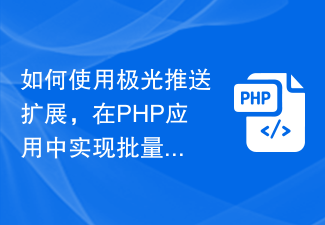 如何使用极光推送扩展,在PHP应用中实现批量消息推送功能Jul 25, 2023 pm 08:07 PM
如何使用极光推送扩展,在PHP应用中实现批量消息推送功能Jul 25, 2023 pm 08:07 PM如何使用极光推送扩展,在PHP应用中实现批量消息推送功能在移动应用的开发中,消息推送是一项非常重要的功能。极光推送是一种常用的消息推送服务,提供了丰富的功能和接口。本文将介绍如何使用极光推送扩展在PHP应用中实现批量消息推送功能。第一步:注册极光推送账号并获取API密钥首先,我们需要在极光推送官网(https://www.jiguang.cn/push)注册
 php如何使用PHP的ZipArchive扩展?Jun 02, 2023 am 08:13 AM
php如何使用PHP的ZipArchive扩展?Jun 02, 2023 am 08:13 AMPHP是一种流行的服务器端语言,可以用来开发Web应用程序和处理文件。PHP的ZipArchive扩展是一个强大的工具,可以在PHP中操作zip文件。在这篇文章中,我们将介绍如何使用PHP的ZipArchive扩展来创建、读取和修改zip文件。一、安装ZipArchive扩展在使用ZipArchive扩展之前,需要确保已经安装了这个扩展。安装方法如下:1.安
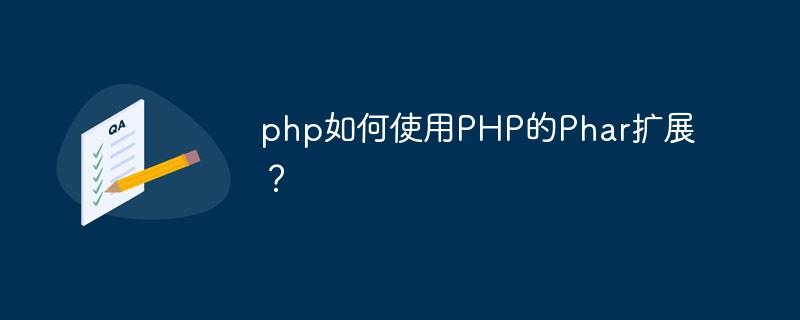 php如何使用PHP的Phar扩展?May 31, 2023 pm 11:31 PM
php如何使用PHP的Phar扩展?May 31, 2023 pm 11:31 PM随着PHP的发展和应用场景的不断扩大,Phar扩展已经成为PHP编程中的重要一环。Phar是PHPArchive的缩写,它可以将多个PHP文件和资源打包成单个文件,方便进行分发和管理。本文将介绍如何使用PHP的Phar扩展来进行打包和管理。安装Phar扩展首先,我们需要检查PHP是否已经安装Phar扩展。在Linux下,通过终端输入以下命令:php-m
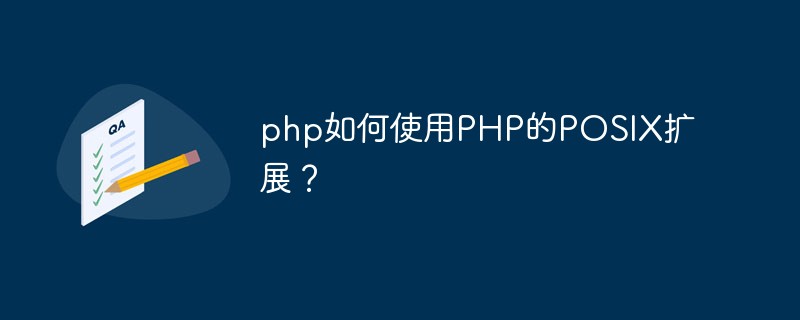 php如何使用PHP的POSIX扩展?Jun 03, 2023 am 08:01 AM
php如何使用PHP的POSIX扩展?Jun 03, 2023 am 08:01 AMPHP的POSIX扩展是一组允许PHP与POSIX兼容操作系统进行交互的函数和常量。POSIX(PortableOperatingSystemInterface)是一组操作系统接口标准,旨在允许软件开发人员编写可在各种UNIX或UNIX类操作系统上运行的应用程序。本文将介绍如何使用PHP的POSIX扩展,包括安装和使用。一、安装PHP的POSIX扩展在
 Vue如何实现组件的复用和扩展?Jun 27, 2023 am 10:22 AM
Vue如何实现组件的复用和扩展?Jun 27, 2023 am 10:22 AM随着前端技术的不断发展,Vue已经成为了前端开发中的热门框架之一。在Vue中,组件是其中的核心概念之一,它可以将页面分解为更小,更易管理的部分,从而提高开发效率和代码复用性。本文将重点介绍Vue如何实现组件的复用和扩展。一、Vue组件复用mixinsmixins是Vue中的一种共享组件选项的方式。Mixins允许将多个组件的组件选项合并成一个对象,从而最大
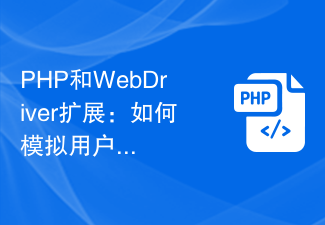 PHP和WebDriver扩展:如何模拟用户点击和输入操作Jul 07, 2023 pm 05:10 PM
PHP和WebDriver扩展:如何模拟用户点击和输入操作Jul 07, 2023 pm 05:10 PMPHP和WebDriver扩展:如何模拟用户点击和输入操作近年来,随着Web应用程序的快速发展,自动化测试变得越来越重要。在自动化测试中,模拟用户操作是一个关键的环节,它可以使我们更准确地测试和验证我们的应用程序。在PHP开发中,我们通常使用SeleniumWebDriver来实现自动化测试。SeleniumWebDriver是一种强大的工具,它可以模拟
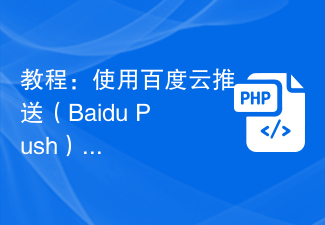 教程:使用百度云推送(Baidu Push)扩展在PHP应用中实现消息推送功能Jul 26, 2023 am 09:25 AM
教程:使用百度云推送(Baidu Push)扩展在PHP应用中实现消息推送功能Jul 26, 2023 am 09:25 AM教程:使用百度云推送(BaiduPush)扩展在PHP应用中实现消息推送功能引言:随着移动应用的迅猛发展,消息推送功能在应用程序中变得越来越重要。为了实现即时通知和消息推送功能,百度提供了一种强大的云推送服务,即百度云推送(BaiduPush)。在本教程中,我们将学习如何使用百度云推送扩展(PHPSDK)在PHP应用中实现消息推送功能。我们将使用百度云


Hot AI Tools

Undresser.AI Undress
AI-powered app for creating realistic nude photos

AI Clothes Remover
Online AI tool for removing clothes from photos.

Undress AI Tool
Undress images for free

Clothoff.io
AI clothes remover

AI Hentai Generator
Generate AI Hentai for free.

Hot Article

Hot Tools

Zend Studio 13.0.1
Powerful PHP integrated development environment

EditPlus Chinese cracked version
Small size, syntax highlighting, does not support code prompt function

Dreamweaver Mac version
Visual web development tools

Atom editor mac version download
The most popular open source editor

mPDF
mPDF is a PHP library that can generate PDF files from UTF-8 encoded HTML. The original author, Ian Back, wrote mPDF to output PDF files "on the fly" from his website and handle different languages. It is slower than original scripts like HTML2FPDF and produces larger files when using Unicode fonts, but supports CSS styles etc. and has a lot of enhancements. Supports almost all languages, including RTL (Arabic and Hebrew) and CJK (Chinese, Japanese and Korean). Supports nested block-level elements (such as P, DIV),





